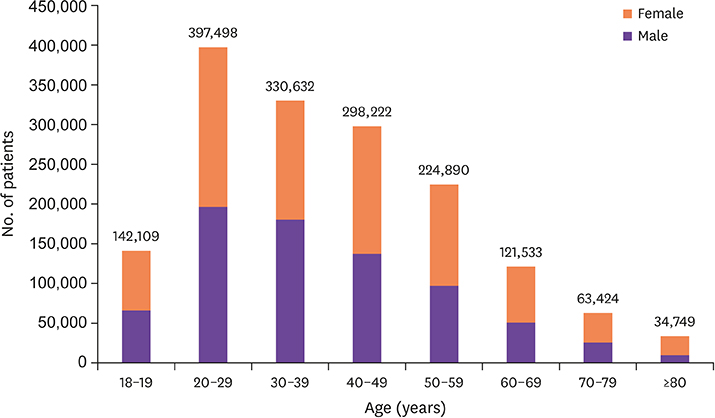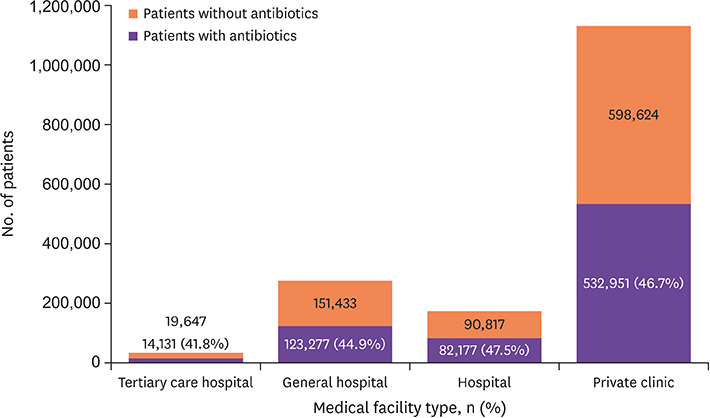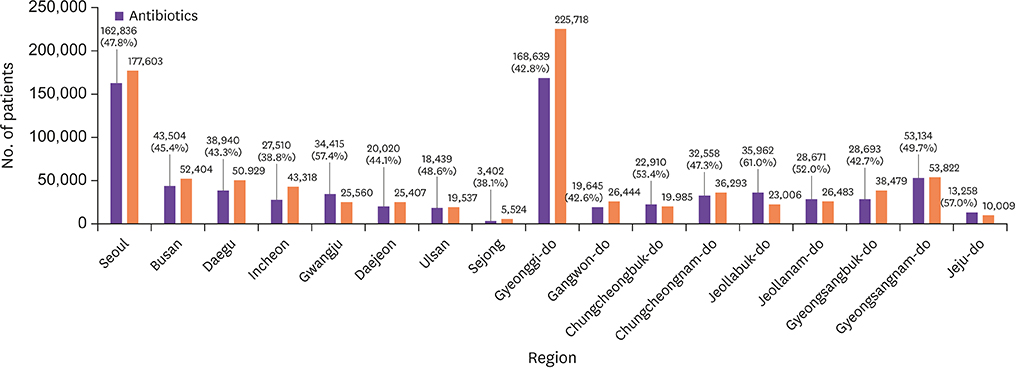Infect Chemother.
2019 Sep;51(3):295-304. 10.3947/ic.2019.51.3.295.
Prescription of Antibiotics for Adults with Acute Infectious Diarrhea in Korea: A Population-based Study
- Affiliations
-
- 1Division of Infectious Diseases, Department of Internal Medicine, Uijeongbu St. Mary's Hospital, College of Medicine, The Catholic University of Korea, Seoul, Korea. yrkim@catholic.ac.kr
- 2Division of Infectious Diseases, Department of Internal Medicine, Kyung Hee University Hospital, Kyung Hee University School of Medicine, Seoul, Korea.
- 3Division of Healthcare Technology Assessment Research, National Evidence-Based Healthcare Collaborating Agency, Seoul, Korea.
- 4Department of Laboratory Medicine, Daejeon St. Mary's Hospital, College of Medicine, The Catholic University of Korea, Seoul, Korea.
- 5Division of Gastroenterology, Department of Internal Medicine, Inha University College of Medicine, Incheon, Korea.
- 6Division of Infectious Diseases, Department of Internal Medicine, Hallym University, Chuncheon Sacred Heart Hospital, Hallym University College of Medicine, Chuncheon, Korea.
- 7Division of Infectious Diseases, Department of Internal Medicine, Soonchunhyang University Seoul Hospital, Soonchunhyang University College of Medicine, Seoul, Korea.
- 8Division of Infectious Diseases, Department of Internal Medicine, Incheon St. Mary's Hospital, College of Medicine, The Catholic University of Korea, Seoul, Korea.
- 9Division of Infectious Diseases, Department of Internal Medicine, CHA Bundang Medical Center, CHA University, Sungnam, Korea.
- KMID: 2459045
- DOI: http://doi.org/10.3947/ic.2019.51.3.295
Abstract
- BACKGROUND
Acute infectious diarrhea (AID) is a commonly observed condition globally. Several studies recommend against the use of empiric antibiotic therapy for AID, except in some cases of travelers' diarrhea. However, many physicians prescribe antimicrobial agents for AID. We aimed to determine the rate of antibiotic use and the associated prescription patterns among adults with AID.
MATERIALS AND METHODS
This population-based, retrospective epidemiological study was performed using Korean National Health Insurance claims data from 2016 to 2017. The study population comprised adults (age ≥18 years) who had visited clinics with AID-related complaints. Exclusion criteria were the presence of Crohn's disease, ulcerative colitis, irritable bowel syndrome, and other non-infectious forms of colitis. Patients who underwent surgery during admission were also excluded.
RESULTS
The study population comprised 1,613,057 adult patients with AID (767,606 [47.6%] men). Young patients (age 18 - 39 years) accounted for 870,239 (54.0%) of the study population. Overall, 752,536 (46.7%) cases received antibiotic prescriptions. The rate of antibiotic administration tended to be higher among elderly patients (age ≥65 years) than among younger patients (49.5% vs. 46.4%, P <0.001). The antibiotics most frequently prescribed in both monotherapy and combination regimens were fluoroquinolones (29.8%), rifaximin (26.8%), second-generation cephalosporins (9.2%), third-generation cephalosporins (7.3%), trimethoprim/sulfamethoxazole (5.5%), and β-lactam/β-lactamase inhibitors (5.3%). Patients who visited tertiary care hospitals had lower rates of antibiotic therapy (n = 14,131, 41.8%) than did those visiting private clinics (n = 532,951, 47.1%). In total, 56,275 (62.3%) admitted patients received antibiotic therapy, whereas outpatients had lower rates of antibiotic prescription (n = 694,204, 46.0%).
CONCLUSION
This study revealed differences between the antibiotics used to treat AID in Korea and those recommended by the guidelines for AID treatment. Multifaceted efforts are necessary to strengthen physicians' adherence to published guidelines.
MeSH Terms
-
Adult*
Aged
Anti-Bacterial Agents*
Anti-Infective Agents
Cephalosporins
Colitis
Colitis, Ulcerative
Crohn Disease
Diarrhea*
Dysentery
Epidemiologic Studies
Epidemiology
Fluoroquinolones
Gastroenteritis
Humans
Irritable Bowel Syndrome
Korea*
National Health Programs
Outpatients
Prescriptions*
Retrospective Studies
Tertiary Healthcare
Anti-Bacterial Agents
Anti-Infective Agents
Cephalosporins
Fluoroquinolones
Figure
Cited by 1 articles
-
Diagnostic value of serum procalcitonin and C-reactive protein in discriminating between bacterial and nonbacterial colitis: a retrospective study
Jae Yong Lee, So Yeon Lee, Yoo Jin Lee, Jin Wook Lee, Jeong Seok Kim, Ju Yup Lee, Byoung Kuk Jang, Woo Jin Chung, Kwang Bum Cho, Jae Seok Hwang
J Yeungnam Med Sci. 2023;40(4):388-393. doi: 10.12701/jyms.2023.00059.
Reference
-
1. Riddle MS, DuPont HL, Connor BA. ACG clinical guideline: diagnosis, treatment, and prevention of acute diarrheal infections in adults. Am J Gastroenterol. 2016; 111:602–622.
Article2. Shane AL, Mody RK, Crump JA, Tarr PI, Steiner TS, Kotloff K, Langley JM, Wanke C, Warren CA, Cheng AC, Cantey J, Pickering LK. 2017 Infectious Diseases Society of America clinical practice guidelines for the diagnosis and management of infectious diarrhea. Clin Infect Dis. 2017; 65:1963–1973.
Article3. The Korean Society of Infectious Diseases, Korean Society for Chemotherapy, The Korean Society of Clinical Microbiology. Clinical guideline for the diagnosis and treatment of gastrointestinal infections. Infect Chemother. 2010; 42:323–361.4. Yoon YK, Kim EJ, Chun BC, Eom JS, Park DW, Sohn JW, Kim MJ. Prescription of antibiotics for adults hospitalized with community-acquired pneumonia in Korea in 2004: a population-based descriptive study. Respirology. 2012; 17:172–179.
Article5. Kim YJ, Park KH, Park DA, Park J, Bang BW, Lee SS, Lee EJ, Lee HJ, Hong SK, Kim YR. Guideline for the antibiotic use in acute gastroenteritis. Infect Chemother. 2019; 51:217–243.
Article6. Korea Centers for Diseases and Prevention Control. Infectious Diseases Portal: Infectious diseases surveillance yearbook. Accessed 20 December 2018. Available at: http://www.cdc.go.kr/npt/biz/npp/portal/nppPblctDtaMain.do?pblctDtaSeAt=1.7. Eurosurveillance editorial team. European union summary report on antimicrobial resistance in zoonotic and indicator bacteria from humans, animals and food 2012 published. Euro Surveill. 2014; 19:20748.8. Zaidi MB, McDermott PF, Campos FD, Chim R, Leon M, Vazquez G, Figueroa G, Lopez E, Contreras J, Estrada-Garcia T. Antimicrobial-resistant Campylobacter in the food chain in Mexico. Foodborne Pathog Dis. 2012; 9:841–847.9. Serichantalergs O, Pootong P, Dalsgaard A, Bodhidatta L, Guerry P, Tribble DR, Anuras S, Mason CJ. PFGE, Lior serotype, and antimicrobial resistance patterns among Campylobacter jejuni isolated from travelers and US military personnel with acute diarrhea in Thailand, 1998-2003. Gut Pathog. 2010; 2:15.
Article10. Cho IN, Yim J, Lee Y, Kim MS, Seo Y, Chung HS, Yong D, Jeong SH, Lee K, Chong Y. Trends in isolation and antimicrobial susceptibility of enteropathogenic bacteria in 2001-2010 at a Korean Tertiary Care Hospital. Ann Clin Microbiol. 2013; 16:45–51.
Article11. Riddle MS, Connor P, Fraser J, Porter CK, Swierczewski B, Hutley EJ, Danboise B, Simons MP, Hulseberg C, Lalani T, Gutierrez RL, Tribble DR. TrEAT TD Study Team. TrEAT TD Study Team. Trial evaluating ambulatory therapy of travelers' diarrhea (TrEAT TD) study: a randomized controlled trial comparing 3 single-dose antibiotic regimens with loperamide. Clin Infect Dis. 2017; 65:2008–2017.
Article12. Acree M, Davis AM. Acute diarrheal infections in adults. JAMA. 2017; 318:957–958.
Article13. Lübbert C. Antimicrobial therapy of acute diarrhoea: a clinical review. Expert Rev Anti Infect Ther. 2016; 14:193–206.
Article14. Lamb HM, Ormrod D, Scott LJ, Figgitt DP. Ceftriaxone: an update of its use in the management of community-acquired and nosocomial infections. Drugs. 2002; 62:1041–1089.15. Mounts AW, Holman RC, Clarke MJ, Bresee JS, Glass RI. Trends in hospitalizations associated with gastroenteritis among adults in the United States, 1979-1995. Epidemiol Infect. 1999; 123:1–8.
Article16. Trinh C, Prabhakar K. Diarrheal diseases in the elderly. Clin Geriatr Med. 2007; 23:833–856. vii
Article




